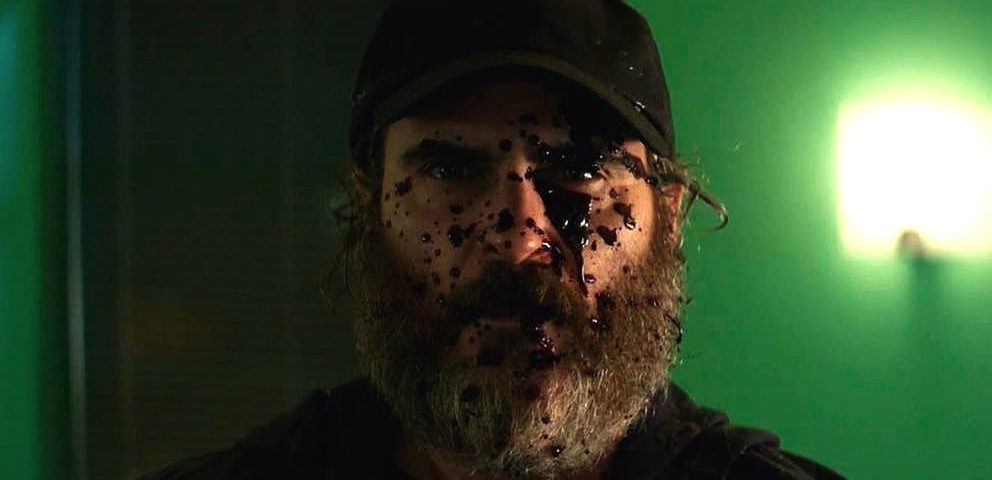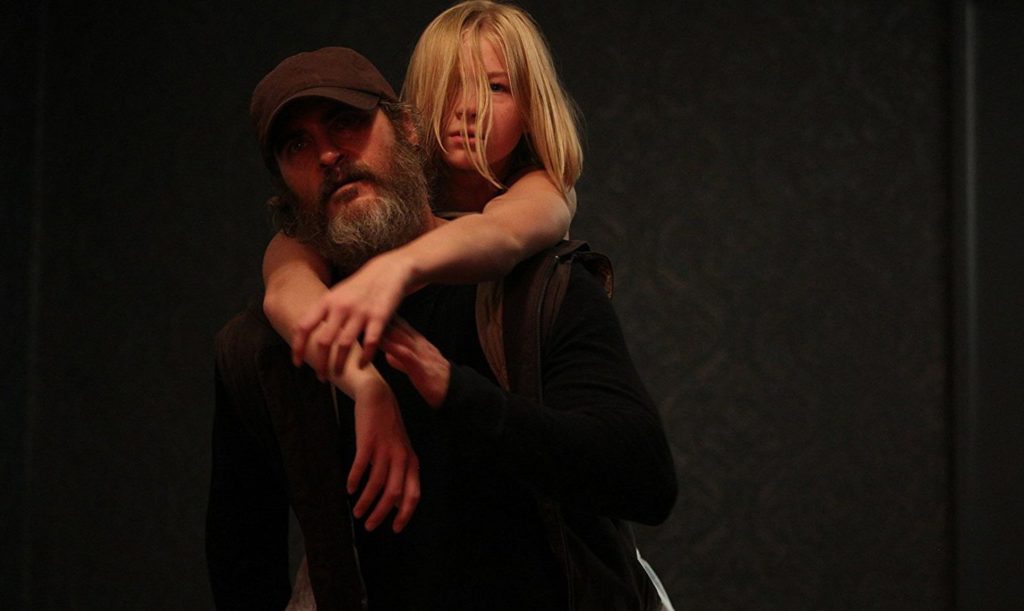Plot descriptions for Lynne Ramsey’s “You Were Never Really Here” fail to do it justice – either in prepping audiences for what they will see, or painting the film in the light in which it must be taken. This is a thoughtful and atmospheric film; it is illusory and dark. With a limit on dialogue and focus on score, cinematography, and acting, it’s a character driven look…not at what its protagonist does for a living – rescuing victims of sex trafficking – but a look at this man’s psychology. Thanks to a tremendous physical performance by Joaquin Phoenix, it accomplishes this task with ease. However, it’s attention to detail and dreamlike sequences may frustrate some casual moviegoers looking for a simple narrative.
Joe (Phoenix) is a complex man. Clinging to reality by a thread comprised of routines and people, his day-by-day life is a mixture of limited human interaction and flashbacks. He’s a traumatized Gulf War veteran – this we glean from several flashbacks of war time, coupled with flashbacks of past jobs he’s done and of himself as a young boy. The violence in Joe’s head is lived out on screen with the violence his job demands. “McCleary said you were brutal,” one character remarks as he hires Joe for a job. “I can be,” Joe responds. His methods are surreptitious and his tools in-your-face and vicious. His weapon of choice is not a gun, knife, or other conventional methods, but, of all things, a ball-peen hammer.
“You Were Never Really Here” is a film defined not by plot but style, and is rife with symbolism and thoughtful shots. The film opens in such a way, depicting Joe post-job; not covered with blood or with violent exposition, but rather in a simple way, with him picking up a small cache of supplies. The scene – as with most of the film – is scored with driving and ambient themes by Radiohead guitarist Johnny Greenwood (who scored another Lynne Ramsey film, “We Need to Talk About Kevin” in 2011). In a way, “You Were Never Really Here” drags viewers along in this way: a collection of shots, flashbacks, and musicality that let the film wash over you like a dream.
Phoenix is of course the driving force of this movie, and is tasked with a role unlike any I’ve seen him in. I recognized Phoenix’s acting ability as far back as Joel Schumacher’s “8MM” – coincidentally also centering on themes of sex trafficking and violence. He’s performed well in a litany of films since, appearing villainous (“Gladiator”), musical (“Walk the Line”), and introspective (“Her”). Here he’s contained in a few dozen lines only, most of the film centering on facial expressions and long shot.

Ramsey and cinematographer Thomas Townend take a chance with Joe in this way, keeping us from getting too close and, in turn, from Joe getting too close to us. He’s defined by those around him and their reaction to him. A hitman he kills grips his hand gently as he passes in one of the film’s most bizarre shots. In another, a young girl Nina he rescues (Ekaterina Samsonov) throws her arms around him in a car as she contemplates her newfound freedom. She feigns a sexual interest in him in the same shot; Joe pushes her away. The trauma of sex trafficking on its victims is shown in prolonged detail in much the same way as Joe’s post-war trauma. Later, we see this same girl, wearing a white dress and with blood-covered hands, highlighting the nature of lost innocence both Joe and Nina possess in an emotional connection.
“You Were Never Really Here” is grounded in this. There are a few scenes that root it in some manner of logical progression, but most of it is dreamlike and inescapable. It’s taut, running at 1 hour and 29 minutes, and a credit to its writing and success is that it never drags. This is a film that presents images and storyline as subjective ideas to be interpreted by the viewer; as such, there are times you may be lost amidst the noise, with the direction and ambience of the film gently plodding you along. It introduces some other characters, such as Judith Roberts, who plays Joe’s elderly mother, and John Dorman, who plays his handler. These characters provide a buffer for Joe. His existence is like a ghost without them; they’re the only ones – along with his newfound connection to Nina – that proves he was ever really here.
At the end of the day, “You Were Never Really Here” is a profound movie. It’s heavy, complicated, intense, and may be difficult for the mainstream crowd to digest. It won Phoenix and Ramsey a ‘Best Actor’ and ‘Best Screenplay’ award at the Cannes Film Festival respectfully. It’s ending, symbolic and powerful, concludes the film in a gentle way that acts as a retribution for its darkness and violence. While different from films we’re used to seeing, it provides a one of kind experience that is hard to overlook.


